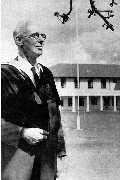View entry
Name: FLETCHER, Philip Humphrey OBE

Birth Date: 3 Mar 1903 Hoylake-cum-West Kirby, Cheshire
Death Date: 15 Feb 1976 Surrey, Parkinson's disease
First Date: 1945
Profession: Senior Education Officer, Headmaster of Prince of Wales School, 1945-61
Area: Nairobi
Book Reference: EAWL, Colonial, O&C, Foster, Web -Old Cambian Soc.
School: Highgate School, St. John's College Cambridge 1922-25
General Information:
Source: Michael Philip
Philip Fletcher was born on 3 March, 1903 in Hoylake-cum-West Kirby, Cheshire. His parents were William Charles Fletcher and Kate Edith Penny. He attended Homefield Preparatory School in Sutton from 1913 to 1916, and the Highgate School in London from 1916 to 1922.
In the 1959 Impala, the Vice-Principal ‘Fritz’ Goldsmith writes, “From his earliest years, ‘P.F.’ had lived in an atmosphere pervaded by schools. His father, W. C. Fletcher, Second Wrangler at Cambridge in 1886 or thereabouts, was the Headmaster of the Liverpool Institute from 1896 to 1904, and the first Chief Inspector of Secondary Schools from 1904 to 1926. A Fellow of St. John's College, Cambridge and one-time President of the Mathematical Association, he is still remembered as a brilliant teacher of Mathematics.
“His son, Philip, born in 1903, was at Highgate School from 1916 to 1922 and became its youngest Head of House. After spurring a very small House to win most of the Inter-House Competitions, and monopolising the Mathematical prizes, he finally became Head of the School.”
Responding to our inquiries about PF’s own school days, Theodore Mallinson of the Highgate School Foundation Office wrote to us that PF “was indeed here from 1916-1922 and you certainly ought to have a special section on him in your website. He was a great man. I knew him when I was a boy at Marlborough from 1922-1927. In 1922 PF went as Philip Baylis Scholar to St. John's College, Cambridge, where he rowed in the First May. Boat in the crew that won the Ladies' Plate. He was placed in the First Class in Part I of the Mathematical Tripos in 1923, and in Part II in 1925. He then spent a year as Jane Eliza Procter Visiting Fellow at the Graduate College, Princeton, in the U.S.A., during which time he was able to indulge, in the Rockies, his passion for walking and mountaineering, as he did later in Europe, Australia and Tasmania.” Upon returning from America, PF became an assistant master at Marlborough College. He was there from 1926 to 1934, but from 1931 to 1933 he took a break of seven terms to teach at Geelong Grammar School in Australia. In 1934 at the age of thirty-one, PF became Second Master and Head of Military and Engineering at Cheltenham College. (He remained there until 1945, deputizing as Master (headmaster) on more than one occasion. PF left Cheltenham College in 1945 to become Headmaster at the Prince of Wales School in Kenya. We found information about his interview and selection in File CO 1045/110 at the Public Records Office in Kew, London, entitled Vacancy for Headmaster of the Prince of Wales School, Nairobi. If any undeserving candidate thought that during the last months of the war he could slip into a congenial colonial headmastership, he was doomed to disappointment. The evidence, sufficiently bulky to require tying up with ribbon, shows that the Colonial Office took this appointment most seriously; indeed their Education Adviser C. Cox wrote “…we want to get a really first class man with boarding school experience for the most important European school in British Colonial Africa.” “The school to which he came in October 1945 had suffered severe difficulties and setbacks during the war years, owing to the evacuation to Naivasha, followed by a fantastic growth of numbers and an acute shortage of staff. During the first five post-war years, the task of working towards high standards in all departments of school life was not an easy one. Most of the staff were new to Kenya, few had any previous boarding school experience and the turnover of staff was bewildering: 21 men acted as Housemasters, for example, between 1946 and 1949. The Headmaster's relationship with his staff was not made easier by the decisiveness, abruptness and avoidance of social intercourse which he practised, in order to encompass, as he habitually did, the work of three or four ordinary men.
